High quality notes are here! About PHP7 performance optimization
Opcache
1. Opcache principle
The normal execution process of PHP is as follows

request (nginx, apache, cli, etc.) –> The Zend engine reads the .php file –> Scans its dictionary and expressions –> Parses the file –> Creates computer code to be executed (called Opcode) –> ;Finally execute Opcode–> response return
Each time the PHP script is requested, the above steps will be executed. If the PHP source code does not change, then the Opcode will not change. Obviously, there is no need to regenerate the Opcode every time. Combined with the ubiquitous caching mechanism in the Web, we can cache Opcode. Wouldn't it be faster to directly access the cached Opcode in the future? The flow chart after enabling Opcode caching is as follows:
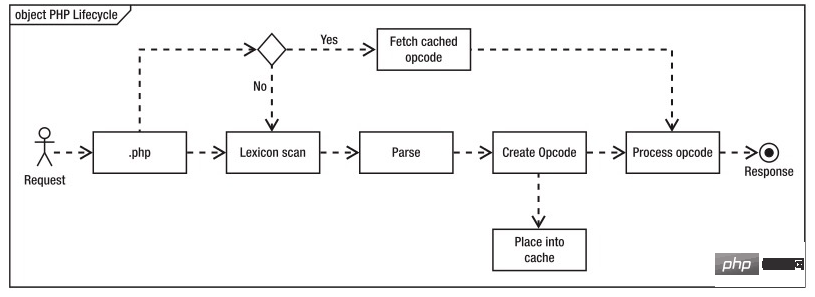
The purpose of Opcode cache is to avoid repeated compilation and reduce CPU and memory overhead.
2. Opcache configuration
Add under php.ini:
// 加载opcache(需确认已安装opcache拓展) zend_extension=opcache.so // 开启opcache opcache.enable = 1 // OPcache共享内存存储大小,单位MB opcache.memory_consumption=1024 // 1G // PHP使用了一种叫做字符串驻留,默认是4MB opcache.interned_strings_buffer=32 // 这个选项用于控制内存中最多可以缓存多少个PHP文件,这个选项必须得设置得足够大,大于你的项目中的所有PHP文件的总和 opcache.max_accelerated_files=80000 // 设置缓存的过期时间(单位是秒),为0的话每次都要检查 opcache.revalidate_freq=3 // 从字面上理解就是“允许更快速关闭” opcache.fast_shutdown=1 // CLI环境下,PHP启用OPcache opcache.enable_cli=1
HugePage
1. HugePage principle
By enabling this feature, PHP7 will "move" its own TEXT segment (execution body) to Huagepage. In previous tests, we can steadily see a 2% to 3% QPS increase on WordPress.
Regarding what Hugepage is, to put it simply, the default memory is paged in 4KB, and the virtual address and the memory address need to be converted, and this conversion requires a table lookup. In order to speed up the table lookup process, the CPU will Built-in TLB (Translation Lookaside Buffer), it is obvious that if the virtual page is smaller, the number of entries in the table will be more, and the TLB size is limited, the more entries, the higher the Cache Miss of the TLB will be, so if we Enabling large memory pages can indirectly reduce this TLB Cache Miss. As for the detailed introduction, I will not go into details after searching a lot on Google. Here I mainly explain how to enable this new feature, which will bring significant performance improvements.
2. HugePage configuration
$ sudo sysctl vm.nr_hugepages=512 // 切勿越大越好,会长占内存
Allocate 512 reserved huge page memory:
cat /proc/meminfo | grep Huge AnonHugePages: 106496 kB HugePages_Total: 512 HugePages_Free: 504 HugePages_Rsvd: 27 HugePages_Surp: 0 Hugepagesize: 2048 kB
Then add in php.ini:
opcache.huge_code_pages=1
Opcache file cache
1. Introduction to Opcache file cache
Use opcache to store compiled php files as files to achieve php source code protection and scripts Acceleration, there will be obvious performance improvement
2. Opcache file cache configuration
Add in php.ini:
opcache.file_cache=/tmp
So that PHP will be in the /tmp directory Cache some Opcode binary export files, which can exist across the PHP life cycle.
You need to restart php-fpm after configuration
Personal test
System: centOs 7
php version: 7.4
nginx
laravel: 8.5
Before optimization
cpu:95%- 96%
Memory: 2G/16G
10 minutes 4W concurrency
Failure rate: 24%
Aggregation report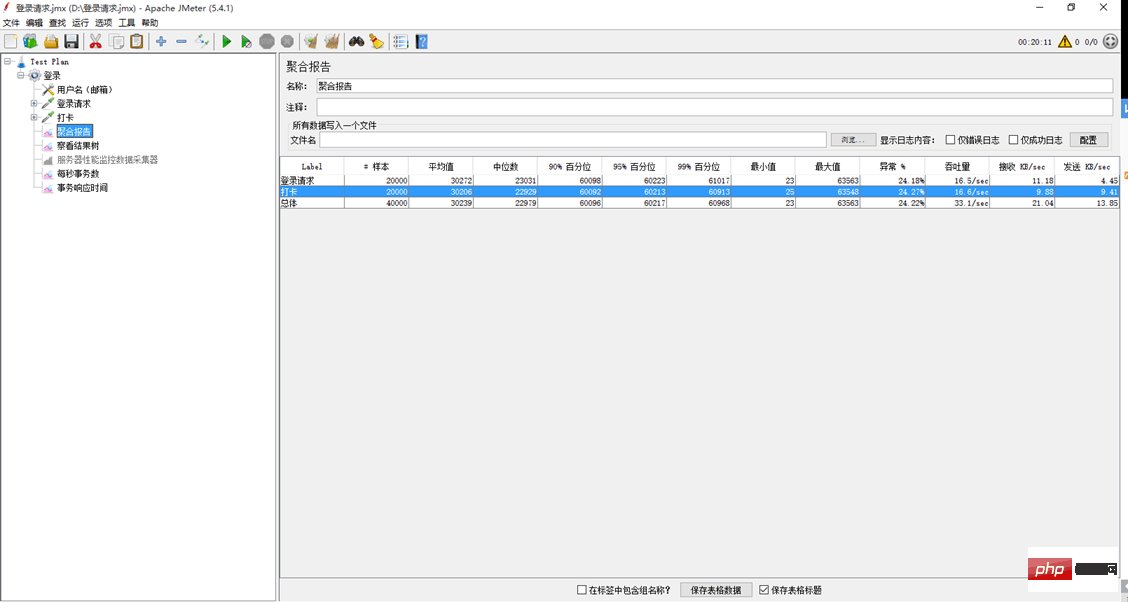
Processing transactions per second
![PHP7 Performance Optimization]
![PHP7 Performance Optimization Notes]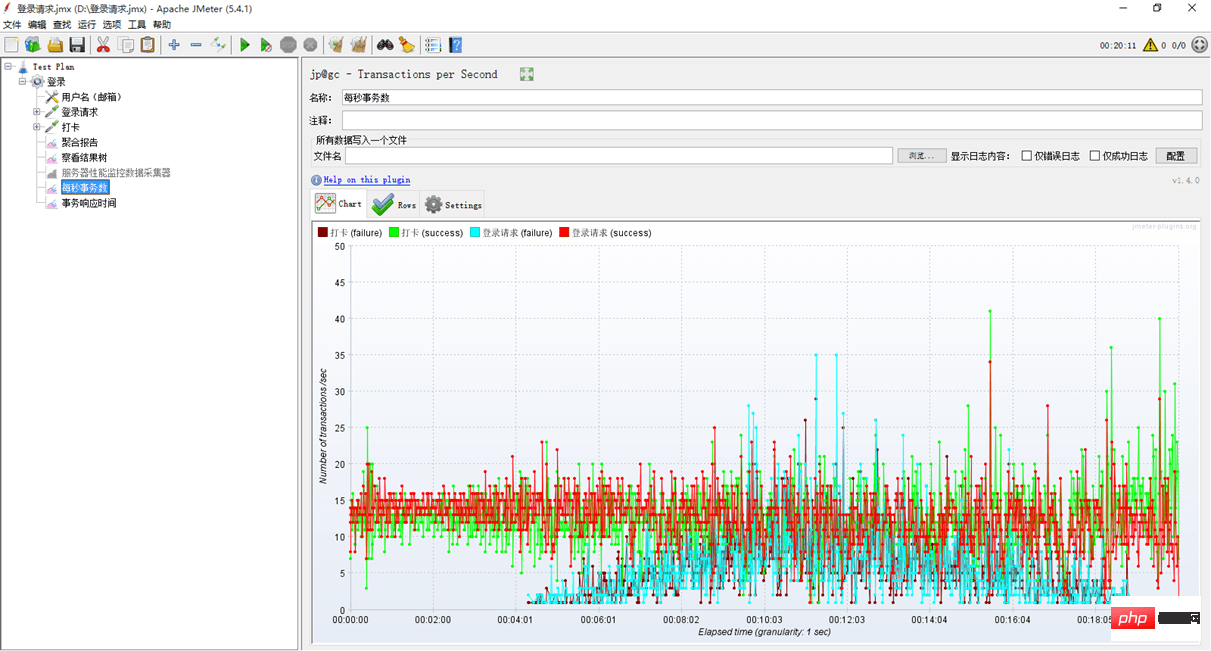
##After optimization
cpu:20%-40 %Memory: 5.8G/16G (here my HugePage is set to 2048)
4W concurrency in 10 minutes
Failure rate: 0%
First stress test
Aggregation report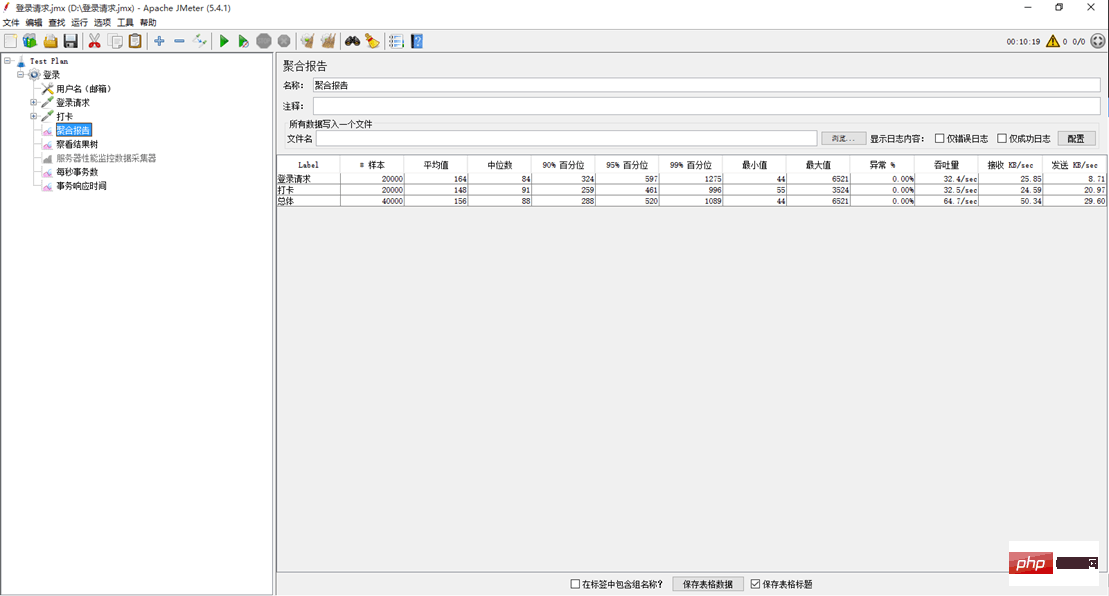
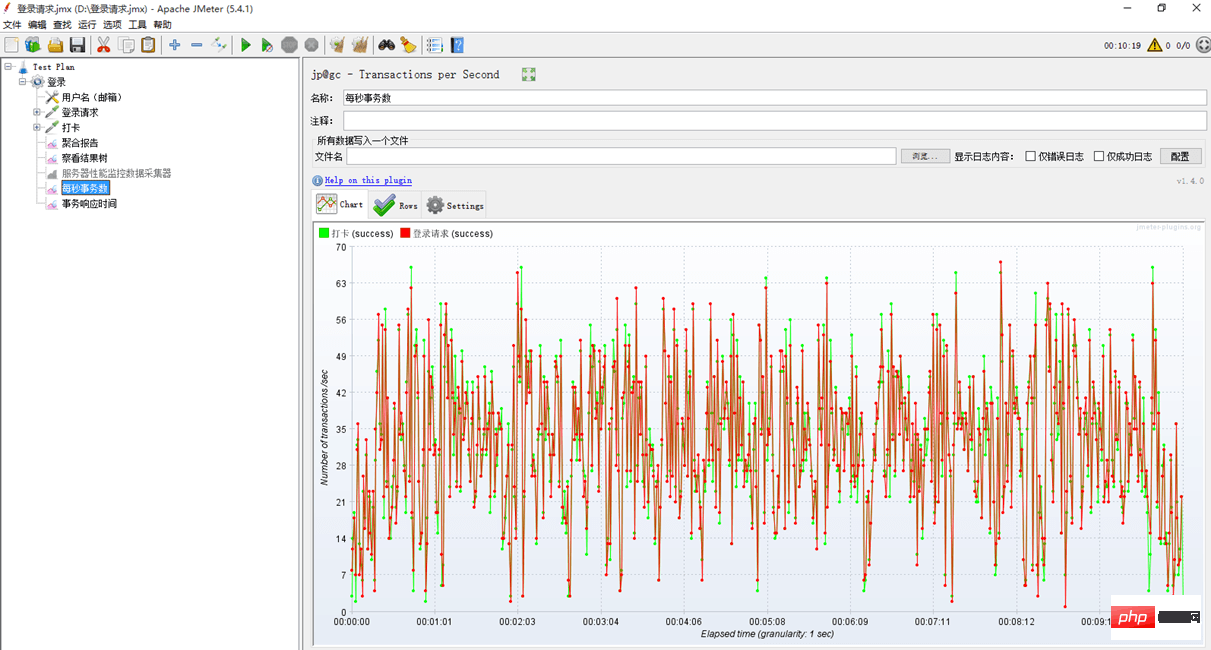
Second stress test
Aggregation report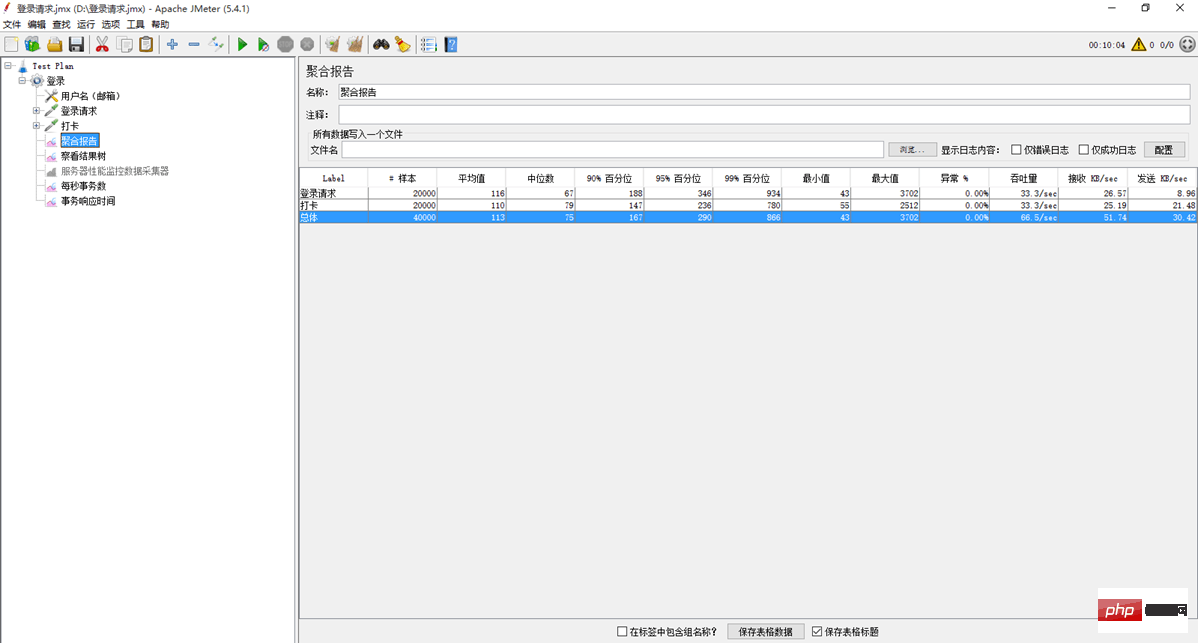
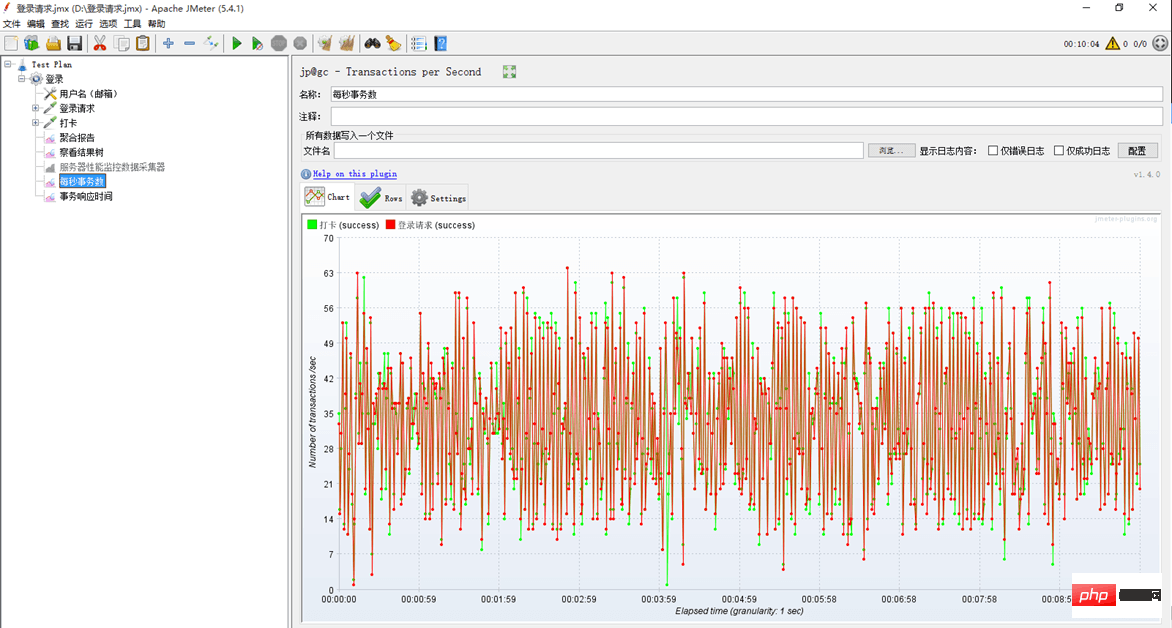
PHP7 Tutorial》
The above is the detailed content of High quality notes are here! About PHP7 performance optimization. For more information, please follow other related articles on the PHP Chinese website!

Hot AI Tools

Undresser.AI Undress
AI-powered app for creating realistic nude photos

AI Clothes Remover
Online AI tool for removing clothes from photos.

Undress AI Tool
Undress images for free

Clothoff.io
AI clothes remover

AI Hentai Generator
Generate AI Hentai for free.

Hot Article

Hot Tools

Notepad++7.3.1
Easy-to-use and free code editor

SublimeText3 Chinese version
Chinese version, very easy to use

Zend Studio 13.0.1
Powerful PHP integrated development environment

Dreamweaver CS6
Visual web development tools

SublimeText3 Mac version
God-level code editing software (SublimeText3)

Hot Topics
 1384
1384
 52
52
 How to install mongo extension in php7.0
Nov 21, 2022 am 10:25 AM
How to install mongo extension in php7.0
Nov 21, 2022 am 10:25 AM
How to install the mongo extension in php7.0: 1. Create the mongodb user group and user; 2. Download the mongodb source code package and place the source code package in the "/usr/local/src/" directory; 3. Enter "src/" directory; 4. Unzip the source code package; 5. Create the mongodb file directory; 6. Copy the files to the "mongodb/" directory; 7. Create the mongodb configuration file and modify the configuration.
 How to solve the problem when php7 detects that the tcp port is not working
Mar 22, 2023 am 09:30 AM
How to solve the problem when php7 detects that the tcp port is not working
Mar 22, 2023 am 09:30 AM
In php5, we can use the fsockopen() function to detect the TCP port. This function can be used to open a network connection and perform some network communication. But in php7, the fsockopen() function may encounter some problems, such as being unable to open the port, unable to connect to the server, etc. In order to solve this problem, we can use the socket_create() function and socket_connect() function to detect the TCP port.
 What should I do if the plug-in is installed in php7.0 but it still shows that it is not installed?
Apr 02, 2024 pm 07:39 PM
What should I do if the plug-in is installed in php7.0 but it still shows that it is not installed?
Apr 02, 2024 pm 07:39 PM
To resolve the plugin not showing installed issue in PHP 7.0: Check the plugin configuration and enable the plugin. Restart PHP to apply configuration changes. Check the plugin file permissions to make sure they are correct. Install missing dependencies to ensure the plugin functions properly. If all other steps fail, rebuild PHP. Other possible causes include incompatible plugin versions, loading the wrong version, or PHP configuration issues.
 PHP Server Environment FAQ Guide: Quickly Solve Common Problems
Apr 09, 2024 pm 01:33 PM
PHP Server Environment FAQ Guide: Quickly Solve Common Problems
Apr 09, 2024 pm 01:33 PM
Common solutions for PHP server environments include ensuring that the correct PHP version is installed and that relevant files have been copied to the module directory. Disable SELinux temporarily or permanently. Check and configure PHP.ini to ensure that necessary extensions have been added and set up correctly. Start or restart the PHP-FPM service. Check the DNS settings for resolution issues.
 How to install and deploy php7.0
Nov 30, 2022 am 09:56 AM
How to install and deploy php7.0
Nov 30, 2022 am 09:56 AM
How to install and deploy php7.0: 1. Go to the PHP official website to download the installation version corresponding to the local system; 2. Extract the downloaded zip file to the specified directory; 3. Open the command line window and go to the "E:\php7" directory Just run the "php -v" command.
 How to automatically set permissions of unixsocket after system restart?
Mar 31, 2025 pm 11:54 PM
How to automatically set permissions of unixsocket after system restart?
Mar 31, 2025 pm 11:54 PM
How to automatically set the permissions of unixsocket after the system restarts. Every time the system restarts, we need to execute the following command to modify the permissions of unixsocket: sudo...
 Why does an error occur when installing an extension using PECL in a Docker environment? How to solve it?
Apr 01, 2025 pm 03:06 PM
Why does an error occur when installing an extension using PECL in a Docker environment? How to solve it?
Apr 01, 2025 pm 03:06 PM
Causes and solutions for errors when using PECL to install extensions in Docker environment When using Docker environment, we often encounter some headaches...
 Which one is better, php8 or php7?
Nov 16, 2023 pm 03:09 PM
Which one is better, php8 or php7?
Nov 16, 2023 pm 03:09 PM
Compared with PHP7, PHP8 has some advantages and improvements in terms of performance, new features and syntax improvements, type system, error handling and extensions. However, choosing which version to use depends on your specific needs and project circumstances. Detailed introduction: 1. Performance improvement, PHP8 introduces the Just-in-Time (JIT) compiler, which can improve the execution speed of the code; 2. New features and syntax improvements, PHP8 supports the declaration of named parameters and optional parameters, making functions Calling is more flexible; anonymous classes, type declarations of properties, etc. are introduced.




